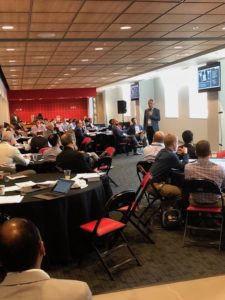Relational Contracting Part III: Tim Cummins on “Shifting Your Mindset to Collaborative Value”
Tim Cummins, CEO of IACCM, is intent on driving change. He is traveling around the globe, speaking with foreign ministries in Dubai, the Australian navy, the Canadian Department of Defense, and the General Services Administration in DC. We were fortunate enough to have him stop by on his global itinerary and speak to our humble group of supply chain executives at the Supply Chain Resource Cooperative. The following is an abridged version of Tim’s speech to the group.

 “Today I am asking you to make sure that you shift your mindset. First, stop thinking procurement – and start thinking about trading relationships! Second, stop thinking that relationships are personal – they are not.. they are about virtual interdependencies. The programs and projects you are undertaking involve an array of stakeholders who you will never meet and who will never meet each other. This is critical in the context of what we mean by relational contracting. Third, stop thinking of your organization as an enterprise working independently. An enterprise is formed from the amalgam of parties working towards a common outcome. An enterprise is a virtual enterprise of agreements to achieve a common goal. Let me ask you a question: Are you hiring an integrated enterprise when you hire a supplier? Yes! In effect, you are hiring an entire ecosystem, not just a supplier. And Fourth ,stop thinking about contracts, and think about contracting. We need to think about contracts as they relate to categories of goods and services, and within those categories, there are a variety of relationship types that emerge, ranging from a purchase order to a joint venture. If you don’t understand how you define the category, you won’t have good results.
“Today I am asking you to make sure that you shift your mindset. First, stop thinking procurement – and start thinking about trading relationships! Second, stop thinking that relationships are personal – they are not.. they are about virtual interdependencies. The programs and projects you are undertaking involve an array of stakeholders who you will never meet and who will never meet each other. This is critical in the context of what we mean by relational contracting. Third, stop thinking of your organization as an enterprise working independently. An enterprise is formed from the amalgam of parties working towards a common outcome. An enterprise is a virtual enterprise of agreements to achieve a common goal. Let me ask you a question: Are you hiring an integrated enterprise when you hire a supplier? Yes! In effect, you are hiring an entire ecosystem, not just a supplier. And Fourth ,stop thinking about contracts, and think about contracting. We need to think about contracts as they relate to categories of goods and services, and within those categories, there are a variety of relationship types that emerge, ranging from a purchase order to a joint venture. If you don’t understand how you define the category, you won’t have good results.
At a recent IACCM meeting, we had a protracted debate: is procurement a sub element of contracting? The decision was YES, after much discussion. When you are engaged in contracting, the primary task involves how you define requirements and who is assigned to oversee performance? How is that done? The opportunity is for a responsible person to take on the task of ensuring the quality and integrity of contracting. Service level agreements and SOW’s require time and effort to develop, and sometimes the business doesn’t welcome having procurement “waste” time on these activities, (‘this is too much work – just get the contract done!) And we have seen that trend increasing; more and more procurement functions are stepping away from spending the required time necessary to develop good SOW’s – because the volume of contracting is increasing.. Between 1994 and 2015, the volume of contracted services as a percentage of revenue, as well the value of business transactions went up by 300%. Outsourcing went from 19% of spend to 56% of spend. Today it is over 60 % of spend.
What is the key risk in outsourcing contracts.. Rob Handfield mentioned in earlier today… the number one risk is the quality of communication; All other risks are subcomponents of poor communication. As we get into relational contracting, how many people out there could confidently say this appears in their risk register? We don’t consider it, but is in fact a huge risk! It should be one of those uncertainties that matter. Because we don’t have defined protocols for effective communication during contract management, we are likely to have negative financial impacts.
Too often we view the major issues in contracting as having to do with litigation. However, it is also true that in many cases, organizations hesitate to sue because they recognize that they are partially to blame for the issues that arise. Too often, we don’t spend time working on the details of the work, and the thinking is “Here is the template – just get it signed.” Mindlessness will be rewarded.
Why be interested in contracts? If you impose forms on suppliers – what is the quality of the data flow and communication between the parties? We have spent huge dollars constructing technologies that facilitate global trade, but haven’t improved the relationships between organizations. And in some cases, we have summarized contracts into 14 pages with 19 URL’s, many of which do not work! As organizations become more disaggregated, we have extended the problem, because in effect we are hiring the supplier ecosystem. If we aren’t communicating with suppliers and they aren’t communicating with their subcontractors – then it is no wonder that we are seeing higher costs.
Key lessons learned
- Contracts based on classical legal theory do not work!
- Contracts cause delay and have limited value when people cannot readily understand them.
- Perceived unfairness in contract terms undermines loyalty and performance.
- Risk is about much more than compliance.
- Global business drives major increases in the cost of commercial operations.
- Current enterprise systems are incapable of handling the complexity of global business relationships and virtual contracts.
What is the next big thing? Tim advocates that we are moving into the Relationship Resource Planning era – and that we need to start to do things with external relationships that drive efficiency and virtual enterprises. Contracts need to become the scaffolding for high performing relationships.
The IACCM View is that the future will consist of the following:
- Ongong development of networked technologies will drive continued enterprise disaggregation and importance of contracting.
- Digital solutions will steadily address the challenge of managing across organizational boundaries and force standardization.
- Roles will shift from transactional oversight to new forms of global outsight and business enablement related to quality and cost of commercial operations, on-demand knowledge, and pro-active problem resolution, design for users, and standards and norms, not templates, and market intelligence and differentiation.
Thanks again Tim for your fantastic insights! We welcome the strong relational contract we have built with IACCM as a joint research partner for the SCRC over the last 20 years!


